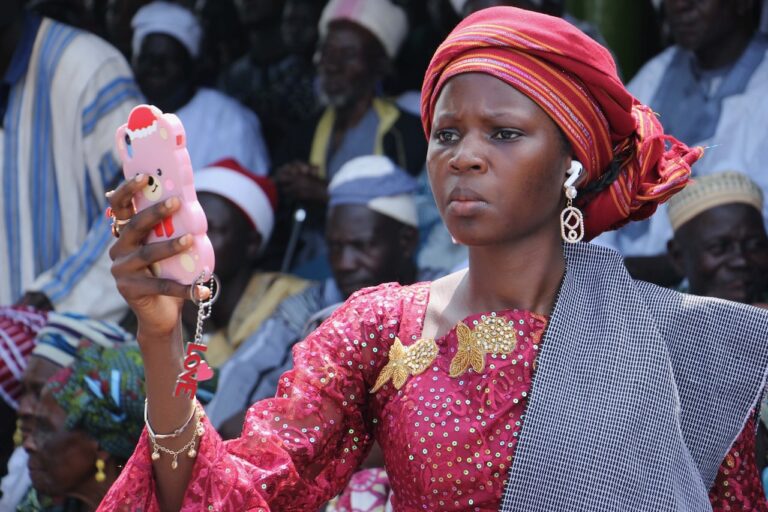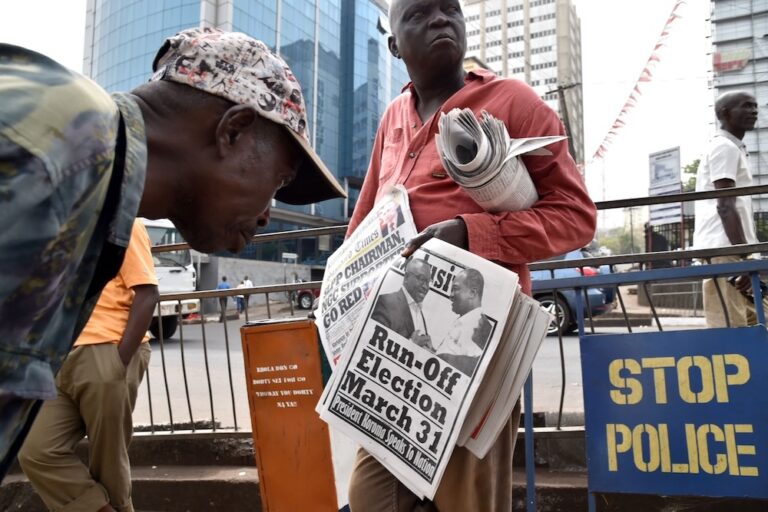January 2022 in Africa: A free expression round up produced by IFEX's Regional Editor Reyhana Masters, based on IFEX member reports and news from the region.
The spotlight on Cameroon as hosts of this year’s African Cup of Nations (AFCON) diverted global attention in January away from the country’s disturbing culture of human rights abuses, including arbitrary and prolonged detentions of journalists, opposition party members, and activists.
Consider the drawn-out trial of septuagenarian journalist Amadou Vamoulké who holds the record for days in detention without a judgment in his case: 2,000 days and still counting, at the time of writing this Regional Brief.
The case against the former head of Cameroon’s national radio and TV broadcaster has been postponed 90 times. Reporters Without Borders (RSF) says “Cameroon’s disgraceful treatment of Vamoulké falls far below even the most basic standards of justice and human dignity.”
Vamoulké’s arrest back in 2016 was part of an anti-corruption campaign: Operation Epervier (Sparrowhawk), which resulted in the arrests of former government ministers, parliamentarians, senior civil servants, and managers of state-run corporations. However, activists, lawyers, and media reports say its intent was to remove influencers from spaces and positions of power, and it failed to lower levels of corruption in the country.
Good intentions but a bad law: media defenders score a win in Botswana
The internationally adopted Financial Action Task Force (FATF) recommendations to fight money laundering and financing of terrorism are being manipulated to shape laws with the intent of legitimising flawed processes in addition to imposing restrictions.
The Botswana government cited non-compliance with recommendation 31 of the FATF in crafting the Criminal Procedure and Evidence Bill of 2022, whose main aim is the interception of communications and forced disclosure of information to state intelligence and law enforcement agencies.
The manner in which the Bill was introduced to citizens – “kept a secret until it was published in the Government Gazette and ultimately tabled for a certificate of urgency in Parliament a week later, speaks volume of its roguish intentions”, points out journalist Thapelo Ndlovu in his blog Indlovu Files.
Regional media advocacy organizations – the Press Council of Botswana, the Botswana Editors Forum, and the Campaign for Free Expression – supported the Media Institute of Southern Africa (MISA) in objecting to the contents of the Bill, and also sent “a delegation to the capital Gaborone to investigate the government’s decision to rush through a Bill that will threaten the country’s media freedom.”
The government took note of the objections, and subsequently agreed to remove the contentious clauses.
Zimbabwe’s restrictive PVO (private voluntary organisations) Amendment Bill
In the same vein, Zimbabwe’s PVO Amendment Bill 2021, introduced by the government in November of last year, was ostensibly to comply with FATF recommendations. However, it imposes severe restrictions while at the same time according the Minister of Public Service and Social Welfare excessive and unfettered powers – powers which will directly impact the operations of organisations from staffing to provision of services. Detailed analysis by the Southern African Human Rights Defenders Network (SAHRDN) shows that in addition to restricting freedom of association, it violates the right to privacy and other political rights as expressly provided for in Zimbabwe’s Constitution.
As MISA points out: “an analysis of the Bill shows that, rather than aligning with FATF recommendations, the government could be using this legislation as a pretext to clamp down on civil society in Zimbabwe and to infringe upon the rights to association, privacy and expression enshrined in the Constitution.”
In response, numerous rights advocacy organisations joined IFEX member MISA in calling on the Zimbabwe government to withdraw the Bill. In a letter to Zimbabwe’s Speaker of Parliament they expressed their collective concern over the contentious clauses.
The two recommendations being made by MISA Regional and all the CSOS are that Zimbabwe’s Parliament:
- Delay debate on the PVO Amendment Bill until it meets local, regional and international standards and best practices for the exercise of freedom of expression, free association and the right to privacy.
- Embark on a wide-ranging consultative process on the regulation of CSOs, Trusts and NGOs. This process should be consultative and reflective of the views of a wide spectrum of Zimbabwean society.
This is yet another attempt by the Zimbabwe government to introduce legislation directed at curbing the activities of non-governmental organisations – a move that often takes place prior to elections. In 2004, government proposed the Non-Governmental Organisations Bill, which sought to ban foreign NGOs concerned principally with “issues of governance”, and deny registration to NGOs receiving foreign funding for “promotion and protection of human rights and political governance issues”.
Nigeria lifts seven-month Twitter ban, avoids ECOWAS judgment
The Nigerian government’s lifting of the ban it had imposed on Twitter in June last year pre-empted the ECOWAS Community Court of Justice judgment – initially scheduled for 20 January and later rescheduled to 16 February.
The seven-month ban was lifted on 12 January following a negotiated process through which the social media platform has agreed to open an office in the capital Abuja, register as a broadcaster, appoint a representative and pay taxes, and commit to being sensitive to “national security and cohesion” issues.
According to a Rest of World report, Twitter is expected “to set up a compliance office and appoint its local representative by the end of the first quarter of 2022. The agreement means the company will be one of the first companies to begin complying with Nigeria’s new digital tax laws, which were created in 2020 but have not yet been implemented. The government will collect taxes on all Twitter revenue, including ads and subscription revenue, coming from Nigeria. The platform will train government employees, including security staff, on how to report content to moderators.”
The ban was imposed on 4 June 2021, just two days after Twitter deleted a tweet by Nigerian President Muhammadu Buhari that threatened secessionists in Nigeria’s southeast region.
Following the ban, several groups – including IFEX Nigerian members Media Rights Agenda (MRA) and International Press Centre (IPC), along with Paradigm Initiative (PIN), Premium Times Centre for Investigative Journalism (PTCIJ) and Tap Initiative for Citizens Development (TICD), journalists David Hundeyin, Samuel Ogundipe, Blessing Oladunjoye, and Nwakamri Zakari Apollo – filed a suit insisting that the suspension of the social media platform violated citizens’ rights to freedom of expression and to impart and receive information.
Journalists under fire
The trend of violations against journalists continued throughout January, with a disturbing increase in authorities demanding to know the identities of their sources. Physical attacks are also contributing to the growing culture of impunity on the continent. In addition to authorities, militant groups, political party loyalists, protestors and criminals all seem to have journalists in their sights.
In retaliation for a story about the rift within Nigeria’s Intelligence Agency (NIA), four intelligence officers forced their way into the offices of the Peoples’ Gazette in Utako in central Abuja, demanding to see the editor, Samuel Ogundipe, and reporter Hillary Essien. Presenting a letter from the head of the NIA, the officers demanded the names of sources for a leaked memo published by the Peoples’ Gazette. The letter also warned that alternative action would be taken if the sources were not provided.
A week earlier, the office of news website Thunder Blowers in Nigeria’s Zamfara state was stormed by eight men, who attacked staff and ransacked the station’s equipment. On finding out that the publication’s Hausa language editor Abdul Balarabewas not present, the attackers then savagely assaulted editors Anas Sani Anka and Mansur Rabiu, instead. In addition to damaging eight desktop computers and a server, they walked away with technical equipment.
In their report, The State of Media Freedom in Nigeria, launched in June last year, the Media Foundation for West Africa (MFWA) and partner organisation IPC detail how impunity has “reached a high, under President Buhari’s government . . . citing violations ranging from murder to torture, arrest and detentions, sentencing, physical assaults, threats against journalists as well as arbitrary shutdown/suspension of media organisations.”
In yet another attempt to get at a source, authorities in Cape Verde summoned journalist and editor of Santiago Magazine Hermínio Silves on three different occasions, and finally charged him with “qualified disobedience” on 27 January for allegedly disclosing confidential judicial information. In December 2021, Silves used classified documents for his report on an ongoing investigation of a government official in connection with the death of a suspect in 2014. Following the publishing of his article, the attorney general’s office launched an investigation on how Silves accessed that information and who his sources were. Silves has vowed to protect his sources at all costs.
Suspended sentences in defamation case
A court in Niamey, Niger handed suspended jail sentences to journalists Moussa Aksar and Samira Sabou after convicting them of defamation. Niger’s narcotics agency had filed the complaint against the journalists for republishing an international report on drug trafficking in the country, which implicated the involvement government officials. Although the agency withdrew its case against them, the prosecution went ahead with the matter and judgment was passed. The report was widely shared on social media, but Moussa and Sabou were the only ones prosecuted for doing so. Sabou – winner of the Index on Censorship Freedom of Expression Award – received a suspended one-month sentence, while Aksar got a suspended two-month jail term, and both were fined.
In brief
The South African Editors Forum (SANEF) have come out in support of Phathiswa Magopeni, following her improper dismissal on 28 January as group executive news and editor-in-chief from public broadcaster South African Broadcasting Corporation. In a case dating back to last year, Magopeni asserts a disciplinary hearing held in December was flawed, and instead attributes her removal to resisting interference by her bosses. The panel had found Magopeni guilty of misconduct, after an episode of a television programme which had been blocked by a court interdict was still aired. “This pattern needs to be condemned because it makes a mockery of labour laws and associated processes. It also leads to a mistrust of our public institutions and denies the public broadcaster their constitutionally protected freedom of media,” says SANEF. In an op-ed for the Daily Maverick, Raymond Suttner contends: “the processes that have led to this moment have been replete with irregularities from the beginning until the present.”
In Ghana, community based Radio Ada – well known for its critical reporting – was forced off air after a vicious attack Twelve men broke into the studio and ordered Gabriel Korley Adjaotor, who was presenting a music programme, to stop his presentation. “Before the presenter could react, they disconnected cables, smashed computers and attacked the console and microphones, disrupting the broadcast in the process,” reports MFWA. Adjaotor had to be is hospitalised, but is recovering.
The lifting of a two-month suspension imposed on Lesotho’s 357FM has been stalled over a family’s contestation over ownership of the radio station. The death of the owner of 357FM during the suspension triggered a family dispute permitting the Lesotho Communications Authority (LCA) to keep the suspension in place until its ownership is clarified. The licence was withdrawn on 21 November after the station allegedly failed to comply with an LCA Broadcasting Disputes and Resolution Panel directive to apologise to an opposition leader.
Articles from independent projects set up by IFEX members, the Media Foundation for West Africa and ADISI-Cameroun, were included among the selection of the Global Investigative Journalism Network’s (GIJN) 10 best investigative stories from sub-Saharan Africa produced in 2021. The Licensed Sex Predator by award-winning journalist Manasseh Azure Awuni who heads the newly-established Fourth Estate is described as one of the most consequential investigations to come out of Africa this past year. The article by the fact checking initiative, Data Cameroon, focuses on the import of gas refrigerators and its impact on citizens despite the country’s laws prohibiting the importation of potentially hazardous refuse.
KiSwahili film Binti – on the creation of an all-woman team, made history as the first Tanzanian movie to go on the popular streaming service Netflix, when it premiered on the platform on 7 January 2022. Before its Netflix release, it was screened at film festivals in America, South Africa, Nigeria, Germany and Tanzania.
Noteworthy
- Veteran Senegalese journalist Sadibou Marong has been appointed the director of Reporters Without Borders’ West Africa bureau.
- Commissioner Ourveena Geereesha Topsy-Sonoo of Mauritius was appointed the new Special Rapporteur on Freedom of Expression and Access to Information in Africa at the 69th Ordinary Session of the African Commission of Human and Peoples’ Rights. She replaces Sierra Leone lawyer Jamesina King, who served as Special Rapporteur from 2019-2021.



